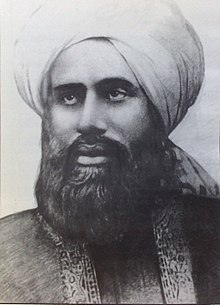
Back نور الدين القرشي Arabic نور الدين القرشى ARZ Nuur ud-Din German حکیم نورالدین Persian Hakeem Noor-ud-Din French Hakim Nuruddin ID Хакийм Нуруддин Kirghiz Hakeem Nooruddin Dutch حکیم نور الدین PNB Хаким Нуруддин Russian
This article needs additional citations for verification. (January 2016) |
Hakeem Noor-ud-Din | |
|---|---|
حکیم نور الدین | |
 Hakeem Noor-ud-Din circa 1878 | |
| In office 27 May 1908 – 13 March 1914 | |
| Succeeded by | Mirza Basheer-ud-Din Mahmood Ahmad |
| Title | Caliph of the Messiah Amir al-Mu'minin |
| Personal life | |
| Born | 8 January 1834 |
| Died | 13 March 1914 (aged 73) |
| Resting place | Bahishti Maqbara, Qadian, India |
| Spouse |
|
| Children | Seven |
| Parents |
|
| Signature |  |
| Religious life | |
| Religion | Islam |
| Part of a series on
Ahmadiyya |
|---|
 |
Hakeem Noor-ud-Din (also spelled Hakim Nur-ud-Din; حکیم نور الدین; 8 January 1834 – 13 March 1914)[2] was a close companion of Mirza Ghulam Ahmad, the founder of the Ahmadiyya Movement, and his first successor and first Ahmadiyya caliph since 27 May 1908.
Royal Physician to the Maharaja of Jammu and Kashmir for many years, his extensive travels included a long stay in the cities of Mecca and Medina in pursuit of religious learning. Noor-ud-Din was the first person to give bay'ah (pledge of allegiance) to Ghulam Ahmad in 1889 and remained his closest associate and confidant, leaving his home in Bhera and setting up permanent residence at Qadian in 1892.[3] He assisted Ghulam Ahmad throughout the course of his religious vocation, himself authored several volumes of rebuttals in response to criticisms raised by Christian and Hindu polemicists against Islam and was instrumental in arranging some of the public debates between Ghulam Ahmad and his adversaries.[4] After Ghulam Ahmad's death, he was unanimously chosen as his successor. Under Noor-ud-Din's leadership, the Ahmadiyya movement began to organise missionary activity with small groups of Ahmadis emerging in southern India, Bengal and Afghanistan, the first Islamic mission in England was established in 1913,[5] and work began on the English translation of the Quran.[6] His lectures on Quranic exegesis and Hadith were one of the main attractions for visitors to Qadian after Ghulam Ahmad. Many prominent scholars and leaders were his students, including Muhammad Ali and Sher Ali, who were themselves Quranic commentators and Mirza Bashir-ud-Din Mahmud who succeeded him as the caliph.
- ^ "Hakeem Noor-ud-Deen (Khalifatul Masih I): The Way of the Righteous" (PDF). Alislam.org. Retrieved 27 January 2016.
- ^ "حضرت خلیفۃ المسیح الاولؓ کی عمر کے متعلق جدید تحقیق". 11 April 2020.
- ^ Ahmad 2003, pp. 84–5.
- ^ Friedmann 2003, pp. 14.
- ^ Friedmann 2003, pp. 15.
- ^ Ahmad 2003, p. 124.